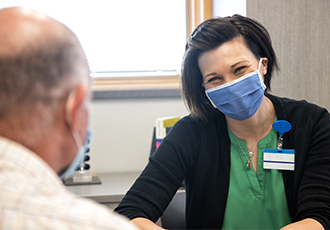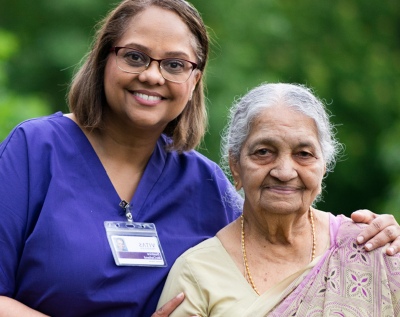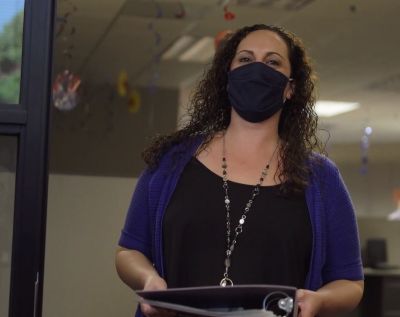What Does a Hospice Social Worker Do?
Hospice social workers provide emotional and logistical support during a vulnerable time for patients and their loved ones. It’s a meaningful, impactful role.
“A good social worker can make a huge difference,” says Marcella Selberg, who has been a social worker with VITAS for 26 years.
Marcella works with compassion, commitment, and kindness as she ensures patients and families receive the support they want and need. “Patients and families come first. People need someone to take the time and listen to them and validate them. Time is precious, and everyone deserves respect.”
The Role of a Hospice Social Worker
At VITAS, hospice social workers are an essential part of the interdisciplinary care team, helping with medical paperwork and sensitive healthcare decisions, and even supporting colleagues through emotionally difficult times.
VITAS management is supportive of me. They value me, and they value my opinion.
Much of the work is less tangible.
“For me, making a difference with a patient means treating them how they want to be treated,” Marcella says. “People have different wishes than what my wishes would be. You have to come in and not be judgmental.”
VITAS social workers must have a master’s degree in social work, any required state licenses or certifications, and at least a year of social work experience in a healthcare setting. Prior hospice experience is ideal but not required.
Going the Extra Mile for Patients
The role of a social worker is not an easy one. It takes sacrifice and a willingness to put others first, while also ensuring you take care of yourself.
“You've got to be a strong person,” says Marcella. “I think people's hearts are in it and they want to do it, but you've got to have boundaries. If you did not have boundaries, your day would never end. But you’ve got to give a lot sometimes. You might miss lunch. You learn to carry snacks.”
You also have to be a strong advocate for your patients.
“We do have to have uncomfortable conversations with people,” Marcella says. “Sometimes we might have to go to a physician and talk to them. We might have to go to upper management. But I feel secure in doing that because I do want to make a difference.”
But then there are quieter moments, such as making meaningful connections with patients. “We had a patient who loved to cook, and she wasn't really able to do that anymore. So I went to her apartment and we made soup together. She enjoyed that.”
Empowered to Do What’s Right
At VITAS, every patient or situation is different. We empower our team members to make decisions, and adjust plans and schedules based on what is best for patients.
“My care plans aren't cookie cutter because patients are all different,” Marcella says. “I feel like VITAS management is supportive of me. They value me, and they value my opinion.
“They award people for good things. I just feel like that's what we're supposed to do, but it is nice to get that confirmation.”
A Family Environment
The interdisciplinary teams create a cohesive bond built on mutual respect and trust. Physicians work as equals with other members of the team to ensure the best possible care for patients.
“Our physicians want all of our input, from the social worker and the chaplain, to the aides,” Marcella says. “I think it’s just invaluable that we're an interdisciplinary team.”
It creates a bond similar to that of a family, where everyone is willing to pitch in and help out. “I love my coworkers. I'm always trying to help the nurses. I know that they're very busy and sometimes their job has to be done where mine can be put off to the next day,” Marcella says.
A New Perspective
Working as a social worker in hospice is an emotional job that requires a selfless, unyielding commitment to patients and families. But it’s also incredibly rewarding.
“I think that you're getting much more than you're giving. Doing little things for patients makes a huge difference for them, and you learn a lot about life in itself, most importantly, not to sweat the small stuff. You just get a whole different perspective on life. The little things do not matter.”

Want to Learn More?
For many working in healthcare, the hospice field is a new — and rewarding — experience. Find out if it’s right for you.
Hospice Career FAQs Sign Up for Career News
